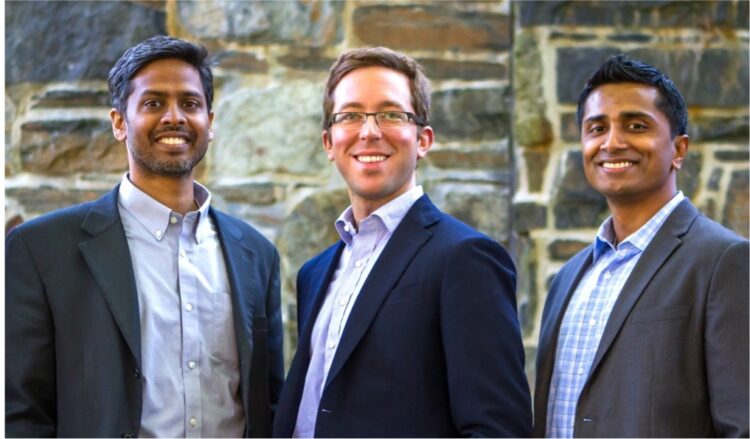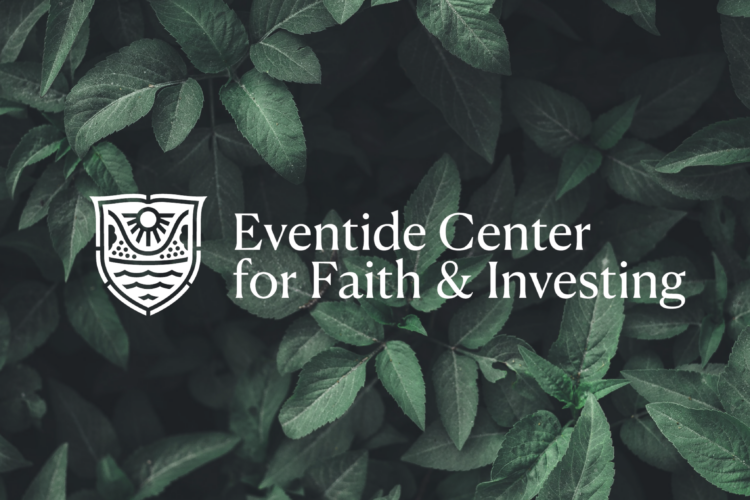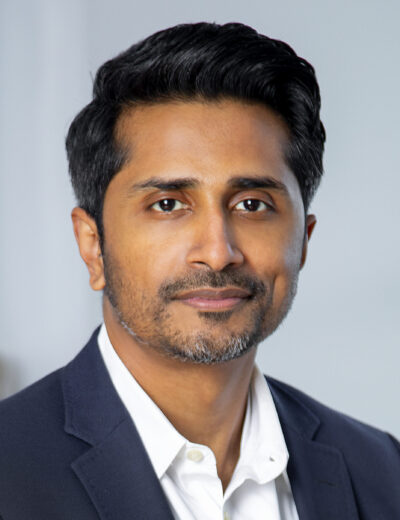I don’t think there’s a person on this earth who would have looked at me—the 26 year-old immigrant kid living in his parents’ unfinished basement, unemployed but pretending to go to work every day, and praying for direction next to the old, haunted-sounding washing machine—and said, “Go start an asset management firm. It’ll be great!”
I can’t help but laugh when I think of this, because I believe God did say that to me, and it truly has been great. It is humbling to see how far we have come.
Laying the Foundation
The earliest seeds of the Eventide story were planted in the 1990s. At about that time, my longtime friend Finny Kuruvilla was doing an MD-PhD program at Harvard Med school. As part of the MD-PhD program, he received a stipend of roughly $10,000 a year. Not a lot of money, but, as Finny says, “I was single at the time, and didn’t have a lot of expenditures, and so I was able to save a portion of that.” His mom, a teller at Bank of America, suggested investing it, and he decided to do so with the goal of saving for a house.
As a busy med student, he wanted to save time and reduce risk by investing in a mutual fund rather than choosing his own investments, but there he ran into a challenge:
“I looked at a number of mutual funds, and what I found was that as I looked at the top 10 holdings of each fund, I could see that every time, one or more of these top 10 holdings were not companies that I felt comfortable owning because of my values, because of my own faith.”
This included holdings involved in things like tobacco, gambling, pornography, abortion, or weaponry. Especially in that era, when faith-based investments were few and before the rise of ESG investing, it felt to him like every mutual fund in America had one or more of those problem elements. Finny explains:
“I could not bring myself to invest in these companies. My roommate at the time was doing his PhD in economics at Harvard, and he helped me learn how to invest for myself. He gave me a few books, one of which was by Peter Lynch, and I devoured the book. I thought it was absolutely fascinating, and decided to use what I learned from Peter Lynch, whom I still consider as a mentor of mine (though I’ve never met him), and implement that in investing.”
Lynch also advocated to “invest in what you know.” Any normal person, Lynch explained, probably knew at least one area of business really well. For example, a mother of young children might have an intuitive understanding of the baby products market; a construction worker might have a great understanding of building materials. Add in some basic accounting and publicly available information, and you might be able to spot companies providing an excellent product at a great price, with a strong future that hadn’t yet been identified by Wall Street.
For Finny, this primarily meant healthcare and biotech companies. He looked for those producing high-quality products and technologies, while also operating in a virtuous manner.
By 2006, Finny had several years of experience (and had even started giving some investing help to friends and family). He and Laura were planning their wedding, and he was a resident at a local hospital. He loved helping his patients, but was already frustrated at the limitations on what he was able to do to help them, feeling that he was “hacking at the branches” and not addressing root issues.
Meanwhile, I had gotten my degree in Economics and had been working in finance for a few years. During that season I had spent some time helping launch an office in India, living in a guest house paid for by my company. I was horrified to see that the people working there slept on a thin, bamboo mat on the floor of the blazing-hot pantry, while air-conditioned guest rooms sat unoccupied. I tried to do something about it, but found myself stymied by various aspects of “the way things work.” I carried with me the frustration of seeing companies and people with the power to bring about human flourishing, choose to block it instead.
Hearing the Call
A few years later, at my next job, office politics led to my manager firing me. I was twenty-six years old, unemployed, and living in my parents’ basement. Humiliated, I maintained my familiar routine so that my parents wouldn’t suspect anything was wrong. I left the house in slacks and dress shirt at 8:00 sharp each morning and drove to Tisch Library at Tufts University, where I sat among the stacks, using the public computers and The Boston Globe to search for jobs.
During these months of playing work, I faced an existential crisis. What was I doing with my life? I yearned to participate in something meaningful, for my life to be caught up in the big story of God’s love for the world. Everything I had been taught pointed to ministry work as being the way to do that, but I struggled with not feeling called to the ministry. Instead, I was spinning my wheels, overdressed in the public library forty hours a week.
Meanwhile, Finny and I were serving in a small house church that met in his apartment in Cambridge, Massachusetts. Finny, wrapping up his residency program, my brother Sony, and Jason Myhre, another member of the house church, carried similar questions to mine, so we began meeting on Wednesday nights at Finny’s apartment to ask God what He wanted us to do with our lives.
Every week for months we met up to pray. We shared ideas, searching for ways to do real social good while also making a good living. We discussed diverse business ideas, going back and forth on a few ideas. But one kept rising to the top: aligning faith with asset management.
All of our other business ideas faded. We felt confident that we held an edge because we believed that we understood business and investing as God originally intended. We also had some industry knowledge and the technical skills needed to identify and evaluate companies.
But we also had hesitations: What if we founded a firm based on biblical principles and then underperformed or failed? Would we bring dishonor to God’s name? With continued prayer, we came to a conclusion: the question was whether we would follow God’s calling, or not follow. To follow was success, regardless of what else happened.
So we started an investment club as we continued to pray about whether this was, in fact, God’s calling. Finny, Sony, and I pooled together a few thousand dollars, pored over corporate documents, and bought a handful of shares, trying to avoid any companies whose activities we considered harmful. We also asked God to use the success of our investment club as a “fleece test”—one that was surely as foolish as the original, but that nonetheless, with some time and early successes, gave us the confidence to move forward.
Ready for Launch
In February 2008, we made the decision and began our work in earnest. By April we had officially started our own investment company, Eventide Asset Management LLC, and by May we had successfully registered as an investment adviser with the SEC, with plans to open a public mutual fund in July. Finny’s wife Laura suggested the name Eventide, which means “evening” in old English. The name seemed perfect, especially as I read from John 9:4, in which Jesus calls on God’s people to use the opportunities of the moment to do redemptive work now, before those opportunities pass and “night cometh, when no man can work.”
A few weeks before we were on track to launch our first mutual fund, a curious stranger named Tim Weinhold happened to google “house churches in Cambridge, Massachusetts” and showed up at ours. Our conversation with him that day–and the relationship over the years that followed—changed the trajectory of Eventide forever.
It was Tim who first encouraged us to think more holistically about what kinds of companies God would want us to invest in—not merely avoiding ill-gotten gain, but companies pursuing flourishing for all people and wise stewardship of His gifts, serving the needs of others well, and creating compelling value for the global common good. Today we think about all of our investment activities through the lens of “avoid, embrace, and engage”—avoiding companies that are not aligned with our core values, embracing those that we see as doing the most good through their work, and engaging with companies on issues of importance to us.
In July 2008, we launched our flagship mutual fund. We named it “Gilead,” a Hebrew word meaning “mountain of witness” or “hill of testimony.” The name, like Eventide, represented our desire that our work would honor God and become like a “mountain of witness” in the investment marketplace.
That first year, like at any entrepreneurial endeavor, was intense, exciting, and a little ragtag. Finny turned down some enticing research positions at reputable firms, and instead joined a biotech venture capital firm, Clarus Ventures, which allowed him to continue to gain experience while also making greater personal investments in Eventide. I married Jaunita, who bravely came with me as I endeavored to raise money for our fledgling firm.
Jason Myhre, who had prayed with us for direction in Finny’s apartment, was able to officially join our team in December 2009 to lead our sales and marketing for many years. More recently, he has turned his attention to our efforts to share how God’s story should shape and direct investing through the Eventide Center for Faith & Investing.
Jason and Tim Weinhold also designed Eventide’s Business 360® diagram, which is built into our logo. It visually represents Eventide’s values framework and clarifies the six specific stakeholder groups that the companies within Eventide’s investments are expected to serve: customers, employees, supply chain, host communities, environment, and society. In line with our Christian faith, we believe that every person is made in the image of God, so these six buckets are intended to represent every person a company touches. No one may be exploited or harmed for the good of the others; everyone matters.
Looking Forward
A lot has happened in the years since. We have launched mutual funds, separately-managed accounts, target risk model illustrations, a private investing line of business, and our 1% initiative where we seek to uplift the global poor through low-interest business loans, in addition to the Center for Faith and Investing. Our firm manages billions of dollars. But what I am most joyful about is that we have been able to build a very diverse team of both Christians and non-Christians who all share our passion for what we call “investing that makes the world rejoice.”
Together, we strive to honor God and serve our clients by investing in companies that create compelling value for the global common good. Our dream isn’t just to have a successful company, but to help every Christian and values-based investor to invest in ways that align both with their financial goals and their core beliefs about what is good, true, and beautiful.
This means, for us, that the implications of the biblical story should be lived out in our investment process: our entire team should be passionate about seeking out companies with goods and services that are genuinely doing good and of service, and practices that love and honor their various stakeholders. We want to spread the word that this kind of investing is possible, impactful, and even life-giving.
We invite you to join us in our pursuit of investing that makes the world rejoice!


















